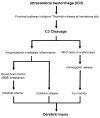The complement cascade as a therapeutic target in intracerebral hemorrhage
- PMID: 19632224
- PMCID: PMC3731062
- DOI: 10.1016/j.expneurol.2009.07.018
The complement cascade as a therapeutic target in intracerebral hemorrhage
Abstract
Intracerebral hemorrhage (ICH) is the second most common and deadliest form of stroke. Currently, no pharmacologic treatment strategies exist for this devastating disease. Following the initial mechanical injury suffered at hemorrhage onset, secondary brain injury proceeds through both direct cellular injury and inflammatory cascades, which trigger infiltration of granulocytes and monocytes, activation of microglia, and disruption of the blood-brain barrier with resulting cerebral edema. The complement cascade has been shown to play a central role in the pathogenesis of secondary injury following ICH, although the specific mechanisms responsible for the proximal activation of complement remain incompletely understood. Cerebral injury following cleavage of complement component 3 (C3) proceeds through parallel but interrelated pathways of anaphylatoxin-mediated inflammation and direct toxicity secondary to membrane attack complex-driven erythrocyte lysis. Complement activation also likely plays an important physiologic role in recovery following ICH. As such, a detailed understanding of the variation in functional effects of complement activation over time is critical to exploiting this target as an exciting translational strategy for intracerebral hemorrhage.
Figures


References
-
- Alexander JJ, Jacob A, Bao L, Macdonald RL, Quigg RJ. Complement-dependent apoptosis and inflammatory gene changes in murine lupus cerebritis. J Immunol. 2005;175:8312–8319. - PubMed
-
- Aronowski J, Hall CE. New horizons for primary intracerebral hemorrhage treatment: experience from preclinical studies. Neurol Res. 2005;27:268–279. - PubMed
-
- Bellander BM, Singhrao SK, Ohlsson M, Mattsson P, Svensson M. Complement activation in the human brainafter traumatic head injury. J Neurotrauma. 2001;18:1295–1311. - PubMed
Publication types
MeSH terms
Substances
Grants and funding
LinkOut - more resources
Full Text Sources
Other Literature Sources
Research Materials
Miscellaneous

